|
Featured picture tools: |
These featured pictures, as scheduled below, appeared as the picture of the day (POTD) on the English Wikipedia's Main Page in July 2016. Individual sections for each day on this page can be linked to with the day number as the anchor name (e.g. [[Wikipedia:Picture of the day/July 2016#1]] for July 1).
You can add an automatically updating POTD template to your user page using {{Pic of the day}} (version with blurb) or {{POTD}} (version without blurb). For instructions on how to make custom POTD layouts, see Wikipedia:Picture of the day.Purge server cache
July 1

|
|
The Battle of the Somme was a battle of the First World War fought between 1 July and 18 November 1916 by the armies of the British and French empires against the German Empire. The largest battle of World War I on the Western Front, it was fought on both sides of upper reaches of the River Somme in France. More than one million men were wounded or killed, making it one of the bloodiest battles in human history. This map shows the situation on the first day on the Somme, as well as Allied gains up to 19 November 1916. Map: Grandiose
Recently featured:
|
July 2

|
|
The Pont du Gard is an ancient Roman aqueduct bridge that crosses the Gardon River in southern France. Located near the town of Vers-Pont-du-Gard, the bridge is part of the Nîmes aqueduct built in the first century AD to carry water from a spring at Uzès to the Roman colony of Nemausus (Nîmes). Because of the uneven terrain between the two points, the mostly underground aqueduct followed a long, winding route that called for a bridge across the gorge of the Gardon River. The Pont du Gard is the highest of all elevated Roman aqueducts, and, along with the Aqueduct of Segovia, one of the best preserved. Photograph: Benh Lieu Song
Recently featured:
|
July 3
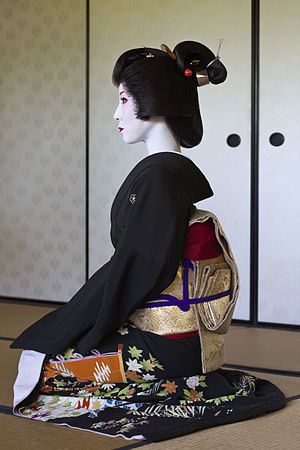
|
Profile of Kimiha, a geisha from Miyagawa-chō, a hanamachi or geisha district in Kyoto. She is wearing a formal black kimono and a Shimada-styled nihongami wig. Her obi is tied in the "taiko" style. These details distinguish her from an apprentice, or maiko. Geisha are traditional Japanese female entertainers who act as hostesses and perform classical music, dance, games and conversation, mainly to entertain male customers. Photograph: JPNEX
Recently featured:
|
July 4

|
Liberty Island is a federally owned island in Upper New York Bay in the United States, best known as the location of the Statue of Liberty. Though surrounded by the waters of Jersey City, New Jersey, the island is an exclave of the New York City borough of Manhattan. Long known as Bedloe's Island, Liberty Island was renamed by an act of the United States Congress in 1956. In 1937 it became part of the Statue of Liberty National Monument and in 1966 it was listed on the National Register of Historic Places as part of Statue of Liberty National Monument, Ellis Island and Liberty Island. Photograph: D Ramey Logan
Recently featured:
|
July 5

|
The Indian chameleon (Chamaeleo zeylanicus) is a species of chameleon found in Sri Lanka, India, and other parts of South Asia. Like other chameleons, this species has a long tongue, feet that are shaped into bifid claspers, a prehensile tail, independent eye movement, and the ability to change skin colour. They move slowly with a bobbing or swaying movement and are usually arboreal. They are usually in shades of green or brown or with bands, but can change colour rapidly. Photograph: M. Arunprasad
Recently featured:
|
July 6

|
Hercules is a constellation named after Hercules, the Roman mythological hero adapted from the Greek hero Heracles. Here he is shown holding Cerberus, a former constellation now included within Hercules. One of the 48 constellations listed by the 2nd century astronomer Ptolemy, Hercules is the fifth largest of the 88 modern constellations. This illustration comes from Urania's Mirror, a set of 32 astronomical star chart cards first published in November 1824. The figure of Hercules appears upside down in the sky relative to neighbouring constellations, such as Corona Borealis. Lithograph: Sidney Hall; restoration: Adam Cuerden
Recently featured:
|
July 7

|
The spotted redshank (Tringa erythropus) is a wader in the large bird family Scolopacidae. First described by German zoologist Peter Simon Pallas in 1764, the spotted redshank measures 29–31 cm (11–12 in) long, with a wingspan of 61–67 cm (24–26 in) and a weight ranging from 121 to 205 g (4.3 to 7.2 oz). It breeds across northern Scandinavia and northern Asia and migrates south to the Mediterranean, the southern British Isles, France, tropical Africa, and tropical Asia for the winter. Photograph: JJ Harrison
Recently featured:
|
July 8
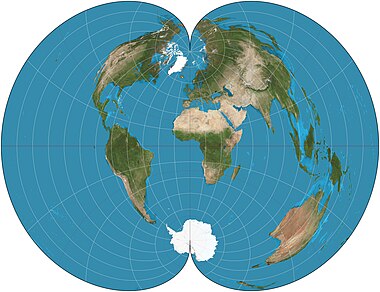
|
The American Polyconic projection is a map projection conceptualized as "rolling" a separate cone tangent to the Earth at each parallel of latitude, rather than a single cone as in a normal conic projection. Each parallel is a circular arc of true scale. The scale is also true on the central meridian of the projection. This projection was in common use by many map-making agencies of the United States from the time of its proposal by Ferdinand Rudolph Hassler in 1825 until the mid-20th century. Map: Strebe, using Geocart
Recently featured:
|
July 9
Subpage 1

|
Interest bearing notes are the American Civil War-era paper money-related emissions of the treasury. This includes the one- and two-year notes authorized by the Act of March 3, 1863, which bore interest at five percent, were a legal tender at face value, and were issued in denominations of $10, $20, $50, $100, $500 and $1000. Extant circulated interest bearing notes are rare, and none of the $1000 denomination are known to exist. Shown here is an interest bearing note in the denomination of $10, issued in 1864. Upon maturity of the note one year after issue, 5% interest was payable. The note features vignettes of Salmon P. Chase, the Eagle of the Capitol, and Peace on its obverse. See another denomination: $20, $50, $100 Banknote: American Bank Note Company and National Bank Note Company; image courtesy of the National Numismatic Collection at the National Museum of American History (Smithsonian Institution)
Recently featured:
|
Subpage 2

|
Interest bearing notes are the American Civil War-era paper money-related emissions of the treasury. This includes the one- and two-year notes authorized by the Act of March 3, 1863, which bore interest at five percent, were a legal tender at face value, and were issued in denominations of $10, $20, $50, $100, $500 and $1000. Extant circulated interest bearing notes are rare, and none of the $1000 denomination are known to exist. Shown here is an interest bearing note in the denomination of $20, issued in 1864. Upon maturity of the note one year after issue, 5% interest was payable. The note features vignettes of a mortar firing and Abraham Lincoln on its obverse. See another denomination: $10, $50, $100 Banknote: American Bank Note Company and National Bank Note Company; image courtesy of the National Numismatic Collection at the National Museum of American History (Smithsonian Institution)
Recently featured:
|
Subpage 3

|
Interest bearing notes are the American Civil War-era paper money-related emissions of the treasury. This includes the one- and two-year notes authorized by the Act of March 3, 1863, which bore interest at five percent, were a legal tender at face value, and were issued in denominations of $10, $20, $50, $100, $500 and $1000. Extant circulated interest bearing notes are rare, and none of the $1000 denomination are known to exist. Shown here is an interest bearing note in the denomination of $50, issued in 1864. Upon maturity of the note two years after issue, 5% interest was payable. The note features vignettes of Caduceus, Justice with Shield, and America on its obverse. See another denomination: $10, $20, $100 Banknote: American Bank Note Company and National Bank Note Company; image courtesy of the National Numismatic Collection at the National Museum of American History (Smithsonian Institution)
Recently featured:
|
Subpage 4

|
Interest bearing notes are the American Civil War-era paper money-related emissions of the treasury. This includes the one- and two-year notes authorized by the Act of March 3, 1863, which bore interest at five percent, were a legal tender at face value, and were issued in denominations of $10, $20, $50, $100, $500 and $1000. Extant circulated interest bearing notes are rare, and none of the $1000 denomination are known to exist. Shown here is an interest bearing note in the denomination of $100, issued in 1864. Upon maturity of the note two years after issue, 5% interest was payable. The note features vignettes of a farmer and mechanic, unidentified building, and cannon on its obverse. See another denomination: $10, $20, $50 Banknote: American Bank Note Company and National Bank Note Company; image courtesy of the National Numismatic Collection at the National Museum of American History (Smithsonian Institution)
Recently featured:
|
July 10
Subpage 1

|
The quire of Exeter Cathedral, an Anglican cathedral in the city of Exeter, Devon, in South West England. Though the founding of the cathedral, dedicated to Saint Peter, dates from 1050, the present building was completed by about 1400. Exeter Cathedral is noted for its early set of misericords and its astronomical clock, and for having the longest uninterrupted vaulted ceiling in England. See another feature: Nave, Lady Chapel Photograph: David Iliff
Recently featured:
|
Subpage 2

|
The nave of Exeter Cathedral, an Anglican cathedral in the city of Exeter, Devon, in South West England. Though the founding of the cathedral, dedicated to Saint Peter, dates from 1050, the present building was completed by about 1400. Exeter Cathedral is noted for its early set of misericords and its astronomical clock, and for having the longest uninterrupted vaulted ceiling in England. See another feature: Quire, Lady Chapel Photograph: David Iliff
Recently featured:
|
Subpage 3

|
The lady chapel of Exeter Cathedral, an Anglican cathedral in the city of Exeter, Devon, in South West England. Though the founding of the cathedral, dedicated to Saint Peter, dates from 1050, the present building was completed by about 1400. Exeter Cathedral is noted for its early set of misericords and its astronomical clock, and for having the longest uninterrupted vaulted ceiling in England. See another feature: Quire, Nave Photograph: David Iliff
Recently featured:
|
July 11

|
Gabrielle et Jean, an 1895–1896 painting by Pierre-Auguste Renoir. It depicts the artist's son, Jean Renoir, as an infant, with his nanny Gabrielle Renard. Renard (1878–1959) moved to the Renoir household at the age of sixteen, shortly before Jean's birth, and remained with the family until after all three of the Renoir children were adults. Over the years, Renard developed a bond with Jean which lasted the remainder of her life, and she frequently served as a model for Pierre-Auguste. Painting: Pierre-Auguste Renoir
Recently featured:
|
July 12

|
Halftone is the reprographic technique that simulates continuous tone imagery through the use of dots, varying either in size or in spacing, thus generating a gradient-like effect. Shown here are three examples of color halftoning with CMYK separations. From left to right: The cyan separation, the magenta separation, the yellow separation, the black separation, the combined halftone pattern, and finally how the human eye would observe the combined halftone pattern from a sufficient distance. Illustration: Pbroks13; SVG: Slippens
Recently featured:
|
July 13

|
The Epirus water frog (Pelophylax epeiroticus) is a species of frog in the family Ranidae. It is found in western Greece, including Corfu, and the southern areas of Albania. The species is collected from the wild for human consumption. Photograph: Benny Trapp
Recently featured:
|
July 14

|
Francisco de Miranda (1750–1816) was a Venezuelan revolutionary who unsuccessfully fought for the independence of the Spanish American colonies. Miranda was directly involved in the French Revolution for which he was awarded the title Hero of the Revolution and Marshal of France. He is the only American engraved on the Arc de Triomphe in Paris. In 1812, he was handed over to the Spanish, dying four years later in a Cádiz prison. His imprisonment is depicted in this 1896 oil painting on canvas by Arturo Michelena. Painting: Arturo Michelena
Recently featured:
|
July 15

|
The Wiesen Viaduct is a single-track railway viaduct (concrete blocks with dimension stone coverage) which spans the Landwasser southwest of the hamlet of Wiesen, Switzerland. Designed by Henning Friedrich, then the chief engineer of the Rhaetian Railway, it was built between 1906 and 1909 by the contractor G. Marasi (Westermann & Cie, Zürich) under the supervision of P. Salaz and Hans Studer (RhB). The Rhaetian Railway still owns and uses the viaduct today for regular service with 29 passenger trains per day. An important element of the Davos–Filisur railway, the viaduct is 88.9 metres (292 ft) high, 210 metres (690 ft) long, and has a main span of 55 metres (180 ft). In 1926, the viaduct was the inspiration for Ernst Ludwig Kirchner's painting Brücke bei Wiesen. Photograph: David Gubler
Recently featured:
|
July 16

|
The painted stork (Mycteria leucocephala) is a large wading bird in the stork family. It is found in the wetlands of the plains of tropical Asia. Its distinctive pink tertial feathers give it its name. This stork forages in flocks in shallow waters along rivers or lakes, immersing its half open beak in water and sweeping it from side to side to snap up its prey. The painted stork nests colonially in trees, often along with other waterbirds. The only sounds it produces are weak moans or bill clattering at the nest. This bird is not migratory and only makes short distance movements in some parts of its range. Photograph: JJ Harrison
Recently featured:
|
July 17

|
Ty Cobb (1886–1961), shown here sliding into third base on August 16, 1924, was an American Major League Baseball (MLB) outfielder. He spent twenty-two seasons with the Detroit Tigers, including six as the team's player-manager, and finished his career with the Philadelphia Athletics. During this time Cobb set ninety MLB records, though his abilities were sometimes overshadowed by his surly temperament and aggressive playing style. In 1936 Cobb was made an inaugural member of the Baseball Hall of Fame, and in 1999 editors at the Sporting News ranked him third on their list of "Baseball's 100 Greatest Players". Photo: National Photo Company; restoration: Lise Broer; crop: jjron
Recently featured:
|
July 18

|
God Speed is a painting by British artist Edmund Leighton which was completed in 1900. It depicts an armored knight leaving for war and leaving his beloved, who ties a red sash around his arm. A griffin on the banister of the stairs is a symbol of strength and military courage. The painting was exhibited in the Royal Academy of Arts in 1900. It is now held in a private collection. Painting: Edmund Leighton
Recently featured:
|
July 19

|
The Great Mosque of Central Java is a mosque in the city of Semarang, Central Java, Indonesia. Dedicated in 2006, the mosque complex covers 10 hectares (25 acres). It can hold up to 15,000 worshipers in the mosque interior and the central courtyard. This photograph was taken from the viewing deck of the 99-metre (325 ft) tall Asmaul Husna Tower, which also houses a museum and a radio station for dakwah. Photograph: Chris Woodrich
Recently featured:
|
July 20
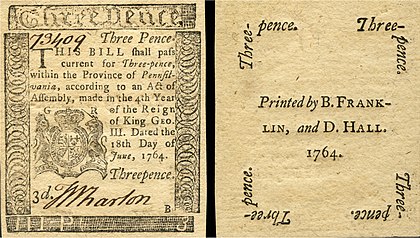
|
|
A banknote for three pence, or 1/80 of a Pennsylvania pound, the currency of colonial Pennsylvania. Created as a response to the global economic downturn caused by the 1720 collapse of the South Sea Company, the currency was worth 25% less than sterling. It was discontinued in 1793 in favor of the United States dollar. This note was signed by Thomas Wharton and printed by Benjamin Franklin and David Hall. Banknote: Benjamin Franklin and David Hall (printers); image courtesy of the National Numismatic Collection at the National Museum of American History (Smithsonian Institution)
Recently featured:
|
July 21
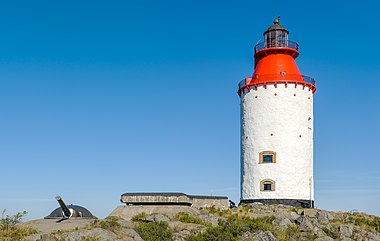
|
The Landsort Lighthouse as viewed from the east. The tower was built in 1689 on Öja Island, Stockholm archipelago's most southern point, with the conical upper section added in 1870. During World War II and the Cold War, Landsort was a military base for the Swedish coastal artillery. Photograph: Arild Vågen
Recently featured:
|
July 22
| File unavailable |
The Vimy Memorial Bridge is a bridge in Ottawa, Ontario, Canada. Completed in 2014, it crosses the Rideau River, connecting Strandherd Drive in Barrhaven and Earl Armstrong Road in Riverside South. The bridge has three vehicle lanes, a dedicated bus lane and a bike lane in each direction. It is named after the Battle of Vimy Ridge. Photograph: Saffron Blaze
Recently featured:
|
July 23
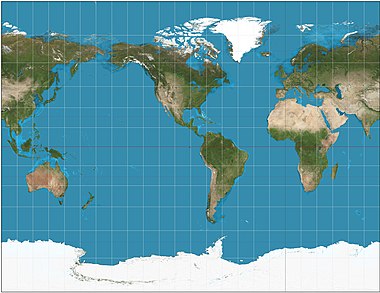
|
The Gall stereographic projection is a cylindrical map projection first presented by James Gall in 1855. It is neither equal-area nor conformal but instead tries to balance the distortion inherent in any projection. Map: Strebe, using Geocart
Recently featured:
|
July 24

|
Alexandre Dumas (1802–1870) was a French writer. His works have been translated into nearly 100 languages, and he is one of the most widely read French authors. Many of his historical novels of high adventure were originally published as serials, including The Count of Monte Cristo, The Three Musketeers, Twenty Years After, and The Vicomte de Bragelonne: Ten Years Later. Photograph: Nadar
Recently featured:
|
July 25

|
Glassy carbon is a non-graphitizing, or nongraphitizable, carbon which combines glassy and ceramic properties with those of graphite. The most important properties are high temperature resistance, hardness (7 Mohs), low density, low electrical resistance, low friction, low thermal resistance, extreme resistance to chemical attack and impermeability to gases and liquids. Glassy carbon is widely used as an electrode material in electrochemistry, as well as for high temperature crucibles and as a component of some prosthetic devices, and can be fabricated as different shapes, sizes and sections. Photograph: Heinrich Pniok
Recently featured:
|
July 26
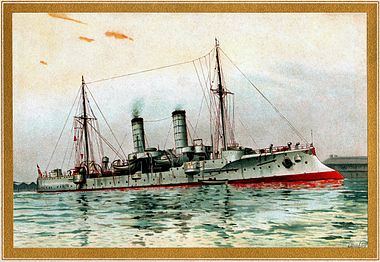
|
SMS Gazelle was the lead ship of the ten-vessel Gazelle class, built by the Imperial German Navy. Armed with a main battery of ten 10.5 cm (4.1 in) guns and two 45 cm (18 in) torpedo tubes, Gazelle was capable of a top speed of 19.5 knots (36.1 km/h; 22.4 mph). She was commissioned into the High Seas Fleet in 1901 and participated in the Venezuela Crisis. She served with the fleet until 1914, when she was employed as a coastal defense ship after the outbreak of World War I. After hitting a mine, she was reduced to a mine storage hulk. In 1920, she was stricken from the naval register and sold for scrap. Lithograph: Hugo Graf; restoration: Adam Cuerden
Recently featured:
|
July 27
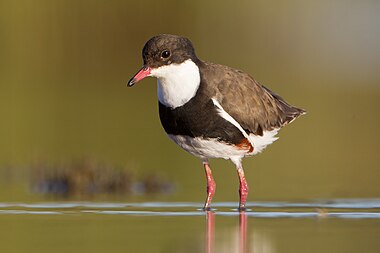
|
The red-kneed dotterel (Erythrogonys cinctus) is a long-legged, medium-sized plover in the subfamily Vanellinae. It is often gregarious and will associate with other waders of its own and different species, even when nesting. It is nomadic and sometimes irruptive. Photograph: JJ Harrison
Recently featured:
|
July 28

|
The interior of the chapel at St John's College, Cambridge. Constructed between 1866 and 1869, to replace a smaller chapel which dated back to the 13th century, this chapel was designed by George Gilbert Scott in a style similar to that of Exeter College, Oxford. It is home to the Choir of St John's College, which has sung daily services since the 1670s. Photograph: David Iliff
Recently featured:
|
July 29

|
The chequered skipper (Carterocephalus palaemon) is a butterfly of the family Hesperiidae named for its uppersides, which are dark brown with a dusting of orange scales at the base of the wings and golden spots. It is widely distributed in northern and central Europe, and its range extends across Asia and Japan, and into North America. Photograph: Haeferl
Recently featured:
|
July 30

|
Almond Blossoms is an 1890 painting by Vincent van Gogh of blossoming almond trees made to celebrate the birth of his nephew and namesake, son of his brother Theo and sister-in-law Jo. It is part of a series of similar paintings completed in Arles and Saint-Rémy, southern France. The works reflect impressionist, divisionist and Japanese woodcut influences. Painting: Vincent van Gogh
Recently featured:
|
July 31

|
|
A mountain massif on Flakstadøya Island overlooking Norwegian County Road 807 to Nusfjord, Lofoten, Nordland, as seen in September 2010. On either side of the road, coastal conifer forests can be seen. Photograph: Simo Räsänen
Recently featured:
|
Picture of the day archives and future dates